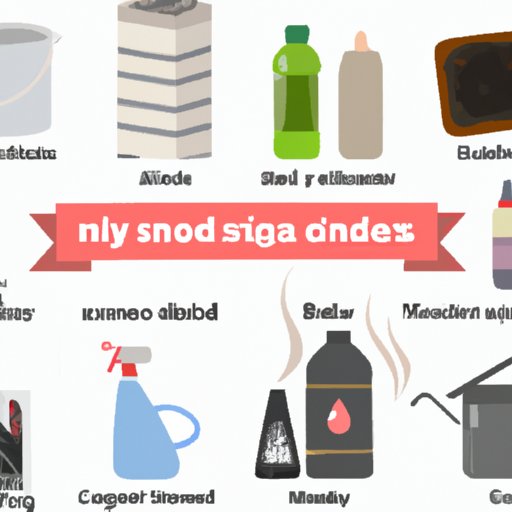
I. Introduction
If you’ve ever experienced that musty, damp smell that mildew leaves behind, you know how unpleasant it can be. Not only is the odor bad, but it can also cause health problems such as respiratory issues and allergies. In this article, we will explore effective solutions for getting rid of mildew smell.
II. Use Vinegar
Vinegar is a versatile and effective solution for removing mildew smells. The acetic acid in vinegar can kill mold and mildew spores, and it can also neutralize the odor they leave behind.
To use vinegar to remove mildew smells from walls, mix one part water and one part vinegar in a spray bottle. Spray the affected area and scrub with a brush or sponge. For fabrics, mix half a cup of white vinegar with your regular wash cycle. To remove mildew smells from floors, mix a gallon of water with a cup of vinegar and mop the area thoroughly.
III. Baking Soda
Baking soda is another natural and effective deodorizer. Its properties allow it to absorb excess moisture that contributes to mildew growth and odor.
To use baking soda for mildew smell removal, sprinkle it over the affected area and let it sit for a few hours before vacuuming it up. You can also create a paste using baking soda and water and apply it to affected fabrics before washing them. For carpets, sprinkle baking soda over the area, let it sit overnight, then vacuum it up the next day.
IV. Dehumidifiers
Mildew thrives in damp, humid environments. One of the best ways to address mildew smell is to reduce the humidity levels in your home with a dehumidifier.
Dehumidifiers work by removing excess moisture from the air. They can be particularly effective in basements or other areas of your home that tend to be damp. When using a dehumidifier, it’s important to choose the right size for the space you want to address, and to clean and maintain it regularly for optimum performance.
V. Charcoal
Activated charcoal is a powerful natural deodorizer that can absorb odors, including those caused by mildew. You can use it to absorb odors in small spaces such as closets or drawers, or for larger spaces such as basements.
To use activated charcoal, simply place it in a container or pouch and put it in the affected area. It will absorb the odors over time, and you can recharge it by placing it in direct sunlight for a few hours every few weeks.
VI. Steam Cleaning
Steam cleaning is an effective and environmentally friendly option for removing mildew smells from carpets, upholstery, and other surfaces. Steam cleaning can kill mold and mildew spores and remove the odors they leave behind.
When using a steam cleaner for mildew smell removal, be sure to follow the manufacturer’s instructions carefully. It’s also a good idea to vacuum the area thoroughly beforehand to remove any loose debris.
VII. Air Purifiers
Air purifiers with HEPA filters can help remove airborne contaminants, including mildew spores. While air purifiers should not be considered a stand-alone solution for mold and mildew problems, they can be useful in conjunction with other remedies.
When choosing an air purifier, look for one with a HEPA filter and consider the size of the room you want to address. Many air purifiers also come with additional features such as ionization or UV-C lights that can help improve air quality.
VIII. Prevention Tips
Preventing mildew smells from developing in the first place is the best course of action. Here are some tips:
- Reduce humidity levels with a dehumidifier
- Improve ventilation in damp areas like bathrooms and basements
- Regularly clean and maintain surfaces like walls and floors
- Use mold-resistant products like paint and caulk
- Keep fabrics clean and dry
IX. Conclusion
Mildew smell can be unpleasant and harmful to your health. Fortunately, there are many effective solutions for removing it. By using vinegar, baking soda, dehumidifiers, activated charcoal, steam cleaning, and air purifiers, you can eliminate mildew smells and create a healthier, more comfortable home. Remember, prevention is key, so be sure to take steps to prevent mildew from growing in the first place.
For more information on preventing and addressing mildew problems, check out resources online or consult with a professional in the field.




